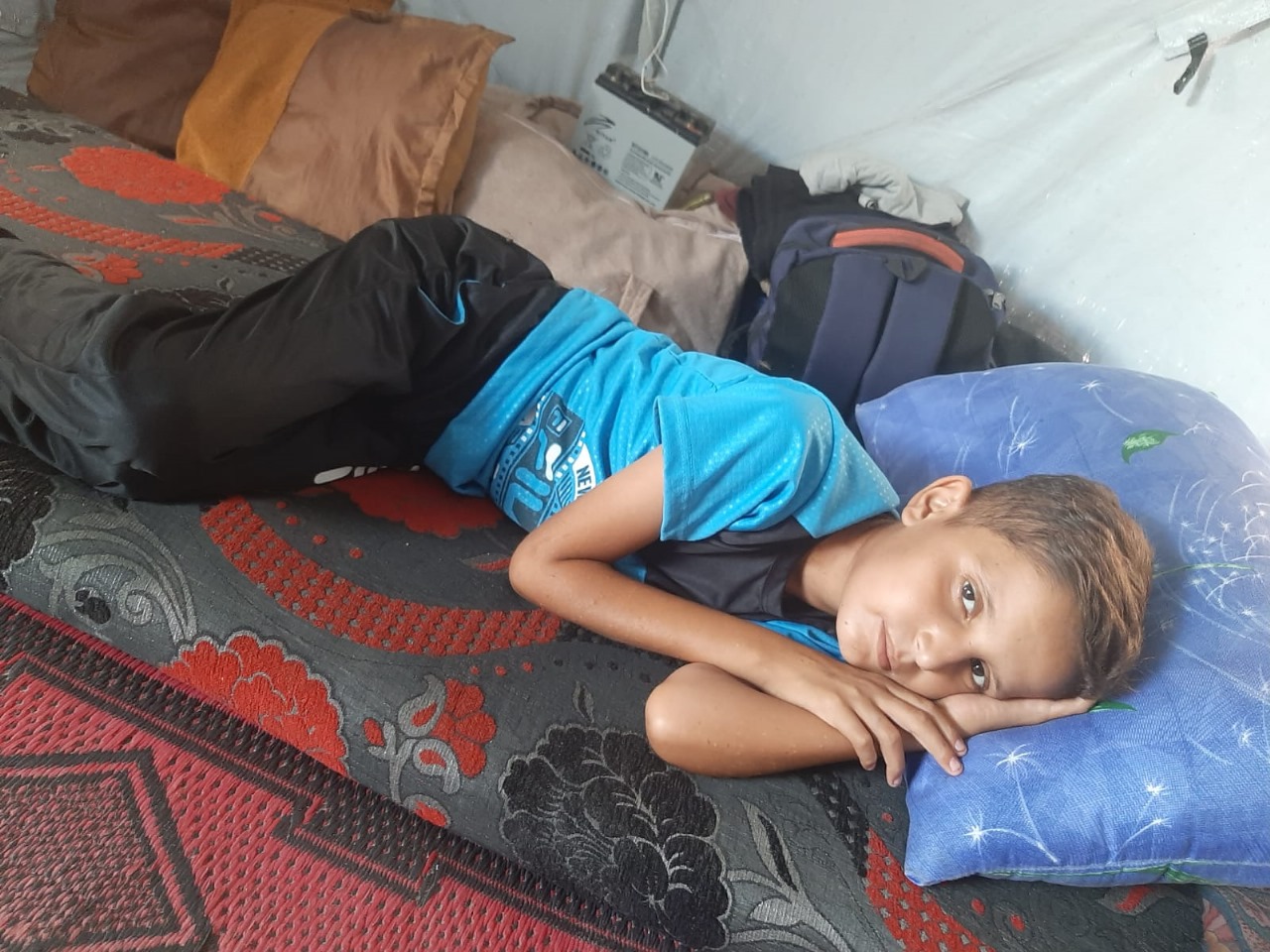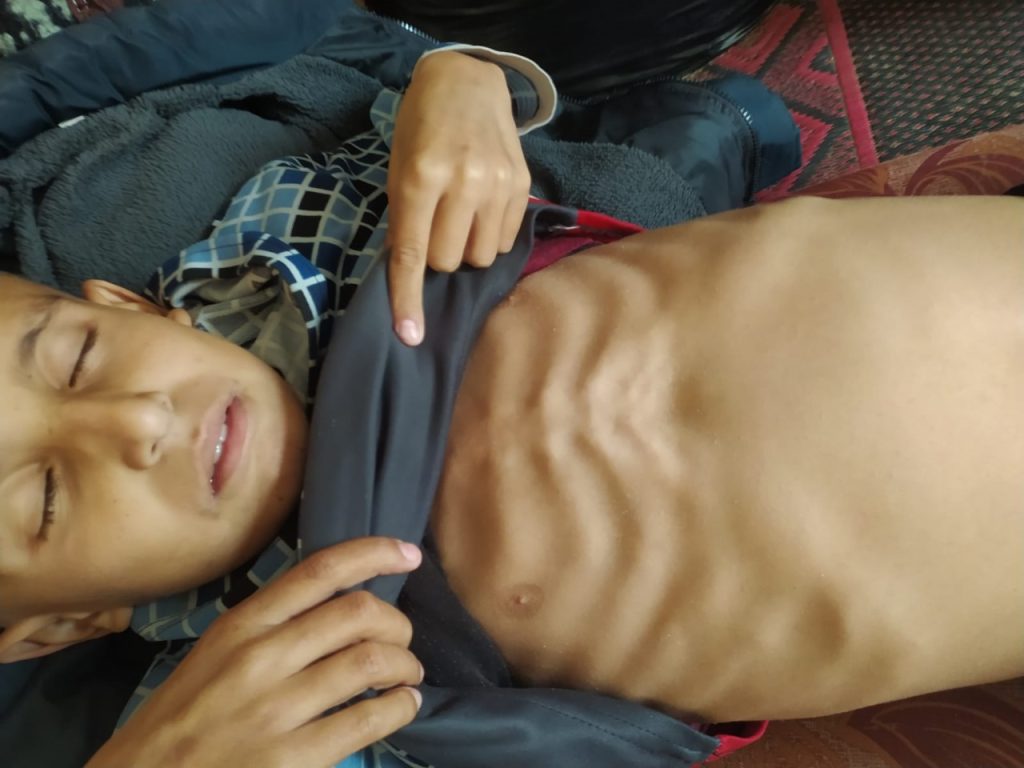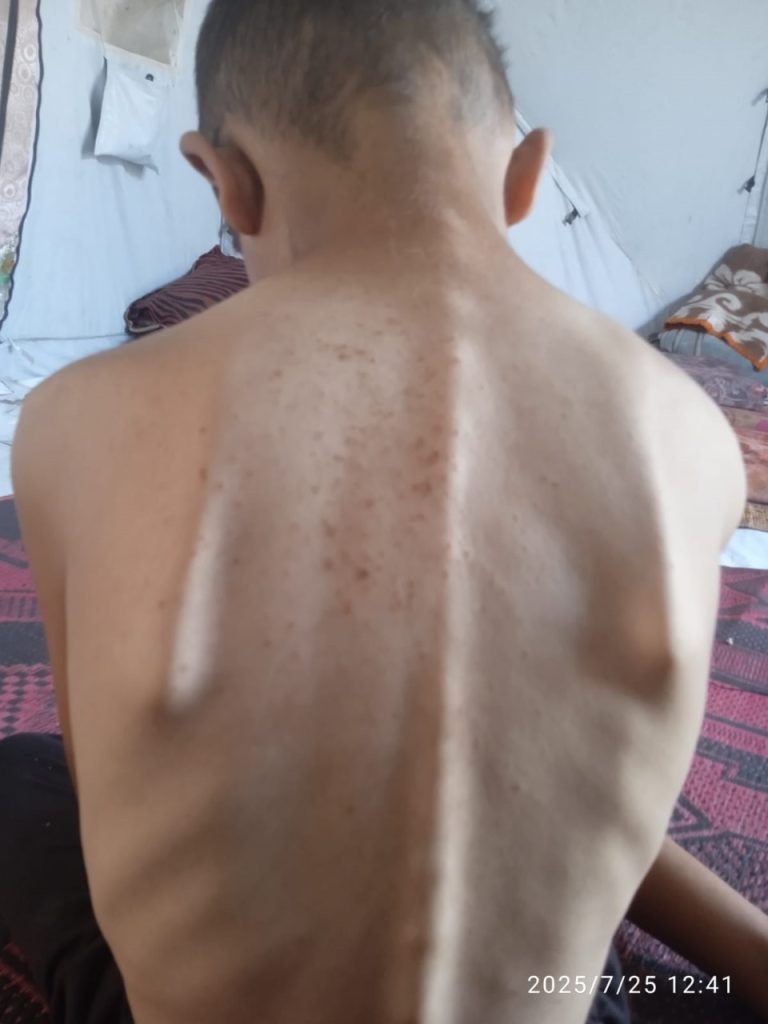
In a makeshift displacement tent beside the local park in Al-Mawasi, Khan Younis, lies 12-year-old Bilal Zanon. His frail body exposes the depth of suffering caused by the Israeli siege, and his pale face encapsulates a long story of pain and waiting.
Bilal does not suffer from a rare, untreatable disease. He has celiac disease—a well-known medical condition that requires only one thing: access to gluten-free food. But in Gaza, even what seems simple can turn into a battle for survival. After 22 months of genocidal war and the starvation policy imposed by the Israeli occupation, Bilal’s basic right to health and nutrition has become impossible to secure.
In a weak voice, carrying the exhaustion of his small body, Bilal told PCHR’s field researcher:
“My hands, legs, and head hurt, and I always have diarrhea. I can’t run or play like other kids. Even walking makes me tired, so I stay lying on the mattress. I wish I could eat bread, pasta, noodles, sweets—everything that other people eat.”
Symptoms and Discovering the Disease
In December 2024, Bilal began showing symptoms: swelling in the abdomen and feet, persistent headaches, hair loss, and recurrent diarrhea.
His father, Mahmoud Zanon (36), who lost his home and job in Rafah due to the war, took him from hospital to hospital in Khan Younis and Rafah, seeking answers. But the exhausted health system, stripped of basic diagnostic tools, failed him.
“We went to the Red Cross Hospital… then Nasser Hospital. Endless tests without a diagnosis. Even the celiac test was not available—I had to do it in a private lab, which I couldn’t afford,” says Mahmoud, who had been working as a shoe seller before losing his job when the Israeli army invaded Brazil neighborhood in Rafah in May 2024.
It was a coincidence that played the role of the doctor. During a visit to Nasser Hospital in January 2025, a relative told him that Bilal’s symptoms resembled those of his own daughter, who had the same disease. Based on this, further specialized tests were done, and Bilal underwent an endoscopy. The biopsy confirmed the diagnosis of celiac disease.
“We cut out wheat, flour, bread—anything with gluten. We focused on meat, poultry, fruits, and vegetables. He improved a lot during the first month,” his father explained.
The Siege Deepens the Suffering
But the improvement did not last. In March 2025, Israel closed the crossings, tightened the siege, and prevented the entry of essential foods, especially those needed by patients like Bilal. Meat, fruit, and vegetables disappeared from the markets—or became unaffordable. With no income, the family could no longer provide the diet Bilal needed.
In a context where all Gaza residents face starvation to some extent, Bilal’s struggle was worse. The disease returned with all its symptoms: hair loss, swollen abdomen, weakness, constant fatigue. He lost nine kilograms, dropping to just 25 kg. He can no longer play or even walk short distances without pain.
Difficult Equations
Every day, Bilal’s father faces impossible choices in trying to feed his son:
“He can eat rice, but too much causes constipation. He can eat lentils, but too much gives him diarrhea. I managed to get a few kilos of corn flour, but it needs special yeast that isn’t available. When baked, it doesn’t rise and becomes dry. Because of this, my son’s suffering has returned. It feels like his growth has stopped.”
“We are not asking for a miracle, just the right food for my son and access to simple treatment that is available everywhere else in the world. Why does it have to be this much suffering?” the father asks.
Bilal’s story is not unique. It is a living testimony to how siege and starvation policies violate the rights to health, food, and dignity. While aid piles up at the crossings, children like Bilal are left to die slowly—victims of an unfolding genocide that Israel commits in full view of a world complicit through silence, inaction, or timid positions.
Bilal and thousands like him do not need words of sympathy. They need urgent intervention to secure at least the minimum of safe nutrition, and a humanitarian system that protects their childhood from deliberate erasure.


My name is Mavis Wanczyk, from Chicopee, Massachusetts. I’m excited to share my fantastic experience with Dr. Kachi, who is outstanding at lottery spell casting online. No matter where you are or how challenging your situation might be, Dr. Kachi can help you win in lotteries and other gambling games. If you’ve been searching for winning numbers without success, Dr. Kachi’s spells are known for providing the right numbers and lucky letters. Many have become millionaires after just one game using his powerful spells. I contacted Dr. Kachi shared the necessary details, and he provided me with six Powerball numbers: 6, 7, 16, 23 26, plus the Powerball number 4. I played them and won $758.7 Million! My life has changed dramatically, and I am incredibly thankful to Dr. Kachi. If you’re interested, you can reach Dr. Kachi by text or call at +1 (209) 893-8075 email him at drkachispellcast @ gmail. com Thank you so much, Dr. Kachi..
This is real, take it seriously. Who will believe that a herbal medicine can cure herpes virus, i never believe that this will work, i have spend a lot money getting drugs from the hospital to keep me healthy, it got to a point that i was waiting for a death to come because i was broke, one day i came across Dr Agbon page. Who is well know for Herpes, HIV, and Cancer cure, i decided to email him i didn’t believe him that much, i just wanted to give him a try, he replied my mail and Needed some Information about me, then i sent them to him, he prepared the herbal meds and he ship the meds as he promised with my details through Courier service. And after receiving it, i took the medicine as prescribed by him after three weeks, he told me to go to the hospital for a check up, and i went, surprisingly after the test the doctor confirm me Herpes simplex virus negative, and i thought it was a joking, i went to other hospital and was also negative, thank you for saving my life, I promise i will always testify of your good works. if you are herpes simplex virus patient, contact him and I am sure you will get cured, contact him now, WhatsApp Number:+2349058797761
Email: dragboherbalhome@gmail.com WebSite: https://dragbonherbalhome.wixsite.com/my-site-3
TANGIBLE INFORMATION ABOUT CHRISTMAS LOAN FOR PLANNING…
This is not a normal post that you see every day on the internet where people give fake reviews and false information about excellent financial assistance. I am aware that many of you have been scammed and that fake agents have taken advantage of those seeking loans. I will not call these normal reviews, I will call this a situation where I am a living witness of how you can get your loan when you meet the company’s requirements. It really does not matter if you have a good credit score or government approval, all you need is a valid ID card and a valid IBAN number to be able to apply for a loan with an interest rate of 3%. The minimum amount is 1000 euros and the maximum amount that can be borrowed is 100,000,000 euros. I give you a 100% guarantee that you can get your loan through this reliable and honest company, they operate 24 hours online and provide loans to all citizens of Europe and outside Europe. They sent me a document that was checked and tested before I got the loan, so I invite everyone who needs a loan to visit them or contact them via email: michaelgardloanoffice@gmail.com
WhatsApp for Europe: +38591560870
WhatsApp for USA: +1 (717) 826-3251
After you contact them, let them know that Mrs. Dejana Ivica from Zagreb gave you the information. Seeing is believing and you will thank me later when you get a loan from them. I made a promise that after I get a loan from them, I will post the good news to everyone online. If you have friends or relatives, including colleagues, you can tell them about this offer and that it is happening this CHRISTMAS TIME.
TANGIBLE INFORMATION ABOUT CHRISTMAS LOAN FOR PLANNING…
This is not a normal post that you see every day on the internet where people give fake reviews and false information about excellent financial assistance. I am aware that many of you have been scammed and that fake agents have taken advantage of those seeking loans. I will not call these normal reviews, I will call this situation where I live a witness to how you can get your loan when you meet the company’s requirements. It really does not matter if you have a good credit rating or government approval, all you need is a proper ID card and a valid IBAN number to be able to apply for a loan with an interest rate of 3%. The minimum amount is 1000 euros and the maximum amount that can be borrowed is 100,000,000 euros. I give you a 100% guarantee that you can get your loan through this reliable and honest company, we operate 24 hours online and provide loans to all citizens of Europe and outside Europe. They sent me a document that was checked and tested before I got the loan, so I invite anyone who needs a loan to visit them or contact them via email: michaelgardloanoffice@gmail.com
WhatsApp for Europe: +38591560870
WhatsApp for USA: +1 (717) 826-3251
After you contact them, let them know that Mrs. Dejana Ivica from Zagreb gave you the information. Seeing is believing and you will thank me later when you get a loan from them. I made a promise that after I get a loan from them, I will post the good news to everyone online. If you have friends or relatives, including colleagues, you can tell them about this offer and that it is happening this CHRISTMAS TIME.
TANGIBLE INFORMATION ABOUT CHRISTMAS LOAN FOR PLANNING…
This is not a normal post that you see every day on the internet where people give fake reviews and false information about excellent financial assistance. I am aware that many of you have been scammed and that fake agents have taken advantage of those seeking loans. I will not call these normal reviews, I will call this situation where I live a witness to how you can get your loan when you meet the company’s requirements. It really does not matter if you have a good credit rating or government approval, all you need is a proper ID card and a valid IBAN number to be able to apply for a loan with an interest rate of 3%. The minimum amount is 1000 euros and the maximum amount that can be borrowed is 100,000,000 euros. I give you a 100% guarantee that you can get your loan through this reliable and honest company, we operate 24 hours online and provide loans to all citizens of Europe and outside Europe. They sent me a document that was checked and tested before I got the loan, so I invite anyone who needs a loan to visit them or contact them via email: michaelgardloanoffice@gmail.com
WhatsApp for Europe: +38591560870
WhatsApp for USA: +1 (717) 826-3251
After you contact them, let them know that Mrs. Dejana Ivica from Zagreb gave you the information. Seeing is believing and you will thank me later when you get a loan from them. I made a promise that after I get a loan from them, I will post the good news to everyone online. If you have friends or relatives, including colleagues, you can tell them about this offer and that it is happening this CHRISTMAS TIME. .;[[———-
I didn’t feel that I would get my credit back on track because I have been dealing with a way to get over my medical bills and college bills for months now. Afterwards, I got introduced to XAP Credit Solution by my nephew about his credit services; and I emailed him requesting for help then not for up to three days, I started to see some improvement on my credit report as my score went up from 458 to 803 excellent score without any physical contact. Email him also here at Xapcreditsolution@GMAIL.COM and thank me later.